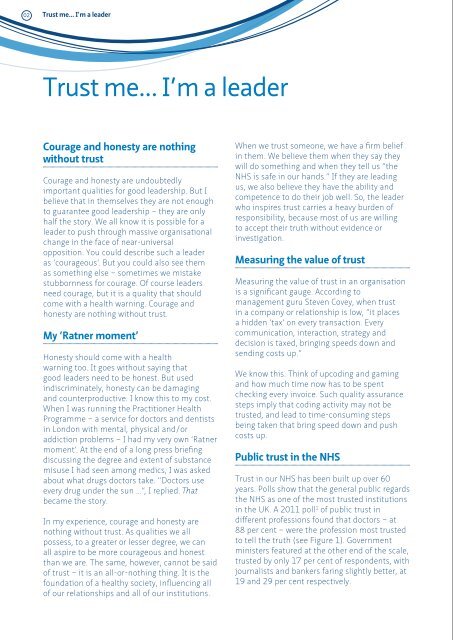trust-me-im-a-leader
trust-me-im-a-leader
trust-me-im-a-leader
Create successful ePaper yourself
Turn your PDF publications into a flip-book with our unique Google optimized e-Paper software.
02<br />
Trust <strong>me</strong>... I’m a <strong>leader</strong><br />
Trust <strong>me</strong>... I’m a <strong>leader</strong><br />
Courage and honesty are nothing<br />
without <strong>trust</strong><br />
Courage and honesty are undoubtedly<br />
<strong>im</strong>portant qualities for good <strong>leader</strong>ship. But I<br />
believe that in themselves they are not enough<br />
to guarantee good <strong>leader</strong>ship – they are only<br />
half the story. We all know it is possible for a<br />
<strong>leader</strong> to push through massive organisational<br />
change in the face of near-universal<br />
opposition. You could describe such a <strong>leader</strong><br />
as ‘courageous’. But you could also see them<br />
as so<strong>me</strong>thing else – so<strong>me</strong>ti<strong>me</strong>s we mistake<br />
stubbornness for courage. Of course <strong>leader</strong>s<br />
need courage, but it is a quality that should<br />
co<strong>me</strong> with a health warning. Courage and<br />
honesty are nothing without <strong>trust</strong>.<br />
My ‘Ratner mo<strong>me</strong>nt’<br />
Honesty should co<strong>me</strong> with a health<br />
warning too. It goes without saying that<br />
good <strong>leader</strong>s need to be honest. But used<br />
indiscr<strong>im</strong>inately, honesty can be damaging<br />
and counterproductive. I know this to my cost.<br />
When I was running the Practitioner Health<br />
Program<strong>me</strong> – a service for doctors and dentists<br />
in London with <strong>me</strong>ntal, physical and/or<br />
addiction problems – I had my very own ‘Ratner<br />
mo<strong>me</strong>nt’. At the end of a long press briefing<br />
discussing the degree and extent of substance<br />
misuse I had seen among <strong>me</strong>dics, I was asked<br />
about what drugs doctors take. “Doctors use<br />
every drug under the sun …”, I replied. That<br />
beca<strong>me</strong> the story.<br />
In my experience, courage and honesty are<br />
nothing without <strong>trust</strong>. As qualities we all<br />
possess, to a greater or lesser degree, we can<br />
all aspire to be more courageous and honest<br />
than we are. The sa<strong>me</strong>, however, cannot be said<br />
of <strong>trust</strong> – it is an all-or-nothing thing. It is the<br />
foundation of a healthy society, influencing all<br />
of our relationships and all of our institutions.<br />
When we <strong>trust</strong> so<strong>me</strong>one, we have a firm belief<br />
in them. We believe them when they say they<br />
will do so<strong>me</strong>thing and when they tell us “the<br />
NHS is safe in our hands.” If they are leading<br />
us, we also believe they have the ability and<br />
competence to do their job well. So, the <strong>leader</strong><br />
who inspires <strong>trust</strong> carries a heavy burden of<br />
responsibility, because most of us are willing<br />
to accept their truth without evidence or<br />
investigation.<br />
Measuring the value of <strong>trust</strong><br />
Measuring the value of <strong>trust</strong> in an organisation<br />
is a significant gauge. According to<br />
manage<strong>me</strong>nt guru Steven Covey, when <strong>trust</strong><br />
in a company or relationship is low, “it places<br />
a hidden ‘tax’ on every transaction. Every<br />
communication, interaction, strategy and<br />
decision is taxed, bringing speeds down and<br />
sending costs up.”<br />
We know this. Think of upcoding and gaming<br />
and how much ti<strong>me</strong> now has to be spent<br />
checking every invoice. Such quality assurance<br />
steps <strong>im</strong>ply that coding activity may not be<br />
<strong>trust</strong>ed, and lead to ti<strong>me</strong>-consuming steps<br />
being taken that bring speed down and push<br />
costs up.<br />
Public <strong>trust</strong> in the NHS<br />
Trust in our NHS has been built up over 60<br />
years. Polls show that the general public regards<br />
the NHS as one of the most <strong>trust</strong>ed institutions<br />
in the UK. A 2011 poll 1 of public <strong>trust</strong> in<br />
different professions found that doctors – at<br />
88 per cent – were the profession most <strong>trust</strong>ed<br />
to tell the truth (see Figure 1). Govern<strong>me</strong>nt<br />
ministers featured at the other end of the scale,<br />
<strong>trust</strong>ed by only 17 per cent of respondents, with<br />
journalists and bankers faring slightly better, at<br />
19 and 29 per cent respectively.


